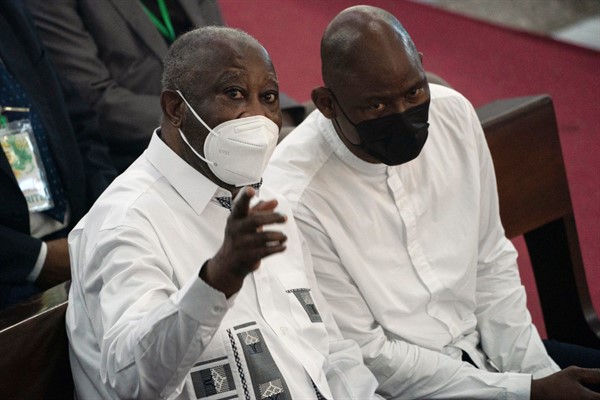After being away for a decade while on trial for crimes against humanity at the International Criminal Court, former President Laurent Gbagbo returned home on June 17 to Cote d’Ivoire, where he was greeted by jubilant crowds. A few months earlier, on March 31, ICC judges confirmed the acquittal of Gbagbo and his co-defendant, former Youth Minister Charles Ble Goude. They had faced charges of inciting violence and committing human rights abuses during the electoral violence that took place in the aftermath of Cote d’Ivoire’s disputed 2010 election.
The 76-year-old Gbagbo continued to exercise influence even during his absence, and he has jumped right back into action since his homecoming, giving speeches and meeting with key political figures. Gbagbo’s return is a unique opportunity for the country’s three political heavyweights—current President Alassane Ouattara, the victor of the troubled 2010 polls; opposition leader Henri Konan Bedie; and Gbagbo—to bridge deep divisions and demonstrate their commitment to national reconciliation. A meeting between Ouattara and Gbagbo, scheduled for Tuesday, presents a prime opportunity for them to rise to the occasion.
But since Gbagbo’s return just over a month ago, the three men’s rhetorical commitment to reconciliation has not yet been accompanied by clear actions to collectively address grievances and signal consensus toward a peaceful and inclusive path forward. Instead, in addition to demonstrating his continued popularity among Ivorians, Gbagbo’s return has brought longstanding political controversies into sharper focus, especially over the legitimacy of Ouattara’s authority and his government’s inadequate measures to support national reconciliation since 2010. Fortunately, there are no imminent elections to raise the stakes, and it is still too early to discern the long-term implications of Gbagbo’s return. Yet, early developments raise questions as to how his return can lead to improvements for the Ivorian population rather than exacerbate old but still-open wounds.

